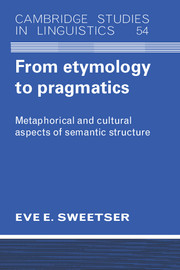Book contents
1 - Introduction
Published online by Cambridge University Press: 05 June 2012
Summary
Language is systematically grounded in human cognition, and cognitive linguistics seeks to show exactly how. The conceptual system that emerges from everyday human experience has been shown in recent research to be the basis for natural-language semantics in a wide range of areas. This study will make use of such a cognitive approach to meaning, and show that it can account in a unified fashion for facts in three diverse areas: polysemy; lexical semantic change; and pragmatic ambiguity. All of these areas have in common the fact that they involve one form being used for more than one function. In semantic change, a form historically acquires a new function to replace or augment its old ones; a question which necessarily arises here is what relates the new sense to already extant senses – are there regularities to be observed about the addition of new senses to words, or the loss of older senses? In the case of polysemy (the synchronic linking of multiple related senses to a single form) a parallel question arises: what can we say about the possible groupings of senses to be observed in polysemous words or morphemes – what, for example, differentiates them from the cases of unrelated meanings which share a form (cases which are termed homonymy rather than polysemy)? In the case of pragmatic ambiguity, a form's basic semantic function is extended pragmatically to cover other referents or meanings: for example, we might say this is the case with a phrase like “How are you?”, which arguably retains its original sense as an inquiry about wellbeing, but is also conventionally situationally interpreted as a greeting or opener for an encounter.
- Type
- Chapter
- Information
- From Etymology to PragmaticsMetaphorical and Cultural Aspects of Semantic Structure, pp. 1 - 22Publisher: Cambridge University PressPrint publication year: 1990



